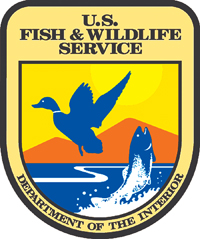
The U.S. Fish and Wildlife Service (Service) announced today it will partner with communities, corporations and nonprofits to help restore the natural environment and boost opportunities for residents in six cities to connect with nature. Together, the Service and partners expect to direct more than $1.7 million to community-led habitat restoration projects and engage thousands of volunteers in the efforts.
Six national wildlife refuges will play a key part in the Urban Wildlife Refuge Partnerships: Hopper Mountain Refuge in Ventura, CA; Bayou Sauvage Refuge in New Orleans, LA; Rocky Mountain Arsenal Refuge in Denver, CO; John Heinz Refuge at Tinicum in Philadelphia, PA; Wallkill River Refuge in Sussex, NJ; and Santa Ana Refuge in Alamo, TX. The partnerships will encourage participation in conservation and outdoor recreation in residents’ local communities.
“Thanks to our partners, we are expanding beyond our national wildlife refuges and finding new ways to educate and inspire young people living in urban centers, helping raise a new generation of conservationists with a passion to care for our lands, water and wildlife,” said Secretary of the Interior Sally Jewell.
The Urban Wildlife Refuge Partnerships, part of the National Wildlife Refuge System’s Urban Wildlife Refuge Program, raises awareness and capacities to engage a new and more diverse constituency in meaningful, collaborative ways to nurture an appreciation of wildlife conservation, both on and off urban refuges.
“The future of our natural resources depends on their being valued by all Americans. That means connecting with urban communities, where 80 percent of the U.S. population now resides,” said Service Director Dan Ashe. “These new Urban Wildlife Refuge Partnerships will support local, community-based projects that protect and restore the places that fish and wildlife need while engaging new communities in the conservation of our shared natural heritage.”
Funding is provided through the National Fish and Wildlife Foundation’s (NFWF) Five Star and Urban Waters Restoration Program. The program focuses on the stewardship and restoration of coastal, wetland and riparian ecosystems across the country. Projects seek to address water quality issues in priority watersheds.
The six national Urban Wildlife Refuge Partnerships are:
- Condor Kids (CA): A pilot education program will teach students in heavily Latino elementary schools in the Fillmore United School District of Ventura County about efforts to recover the endangered California condor. The program also will build their skills in science, technology, engineering and math. Students will make field trips to Hopper Mountain Refuge, a condor nesting area, to meet with recovery biologists, learn about condor monitoring, and look through nest cameras. Partners in the project include the Santa Barbara Zoo and the Cornell Lab of Ornithology.
- Wallkill Connection: Fostering Urban River Stewards (NJ/NY): The project will involve youth and adults from a low-income Yonkers, New York, neighborhood in restoring land near public housing along the Saw Mill River. Participants will visit Wallkill River Refuge to learn about riverside restoration; refuge staff will make return visits to Yonkers to lend their expertise. Partners include the Yonkers-based Groundwork Hudson Valley urban environmental nonprofit. Youth participants are from Groundwork’s Green Team (a summer youth employment program).
- Habitat Is Where It’s At (LA): Underserved New Orleans students will help restore degraded wetland in Bayou Sauvage Refuge while learning about wetland habitat. Younger students will cultivate and grow marsh grass and trees in schoolyard nurseries. Older students will help with project planning, data collection and biological monitoring to assess restoration success. Partners include the University of New Orleans Coastal Education and Research Facility.
- Community Greening and Restoration Project (CO): Working with the community and partners including Environmental Learning for Kids, the Service will help turn a degraded detention pond in an underserved Denver neighborhood into a local park that connects to nearby Rocky Mountain Arsenal Refuge. The park would offer expanded educational programming for youth and families in Montbello and Commerce City.
- PSJA, Preserving for Future Generations (TX): The cities of Pharr, San Juan and Alamo will work with Santa Ana Refuge and students and teachers to create natural habitats at three elementary school campuses. At community-led events, students, teachers and parents will learn about the region’s unique Tamaulipan Brushland ecosystem – found only in the four southernmost counties of the state – and about conservation in the Lower Rio Grande Valley.
- Neighborhood Environmental Stewardship (NESt) (PA): John Heinz Refuge at Tinicum and the National Audubon Society will expand a program that engages Philadelphia residents in conservation through hands-on programming in schools, in neighborhoods and at the refuge. The program includes a native plant propagation program at Fairmount Park and citizen science activities at the refuge. FedEx is a partner in the project.
These new Urban Wildlife Refuge Partnerships bring the number of such Service-backed efforts to 14 nationwide. The Service and its partners will also add additional funding to the eight Urban Wildlife Refuge Partnership established in 2013, located in New Haven, CT; Houston, TX; Chicago, IL; Providence, RI; Seattle, WA; Baltimore, MD; Los Angeles, CA; and Albuquerque, NM.
The Five Star and Urban Waters Restoration Program began in 1999 as a partnership between the National Fish and Wildlife Foundation, National Association of Counties, Wildlife Habitat Council and the U.S. Environmental Protection Agency. The program seeks to develop community capacity to sustain local natural resources for future generations by providing funding to diverse local partnerships.
Contact:
Vanessa Kauffman
703-358-2138
vanessa_kauffman@fws.gov
Logo courtesy U.S. Fish and Wildlife Service
 Your Privacy Choices
Your Privacy Choices
 The
The